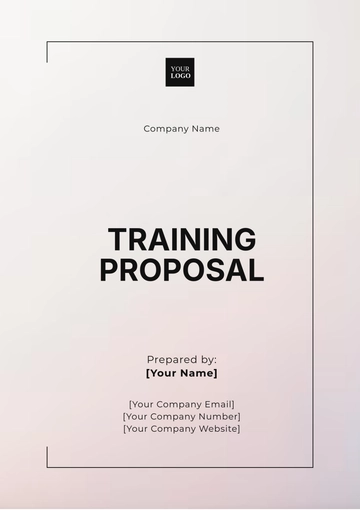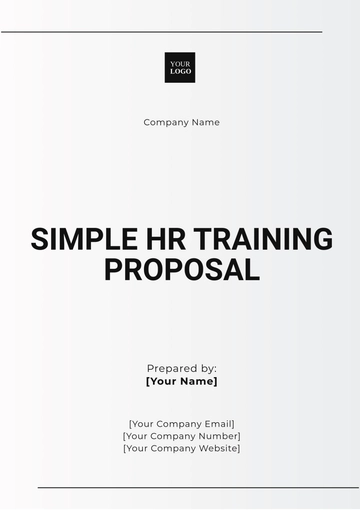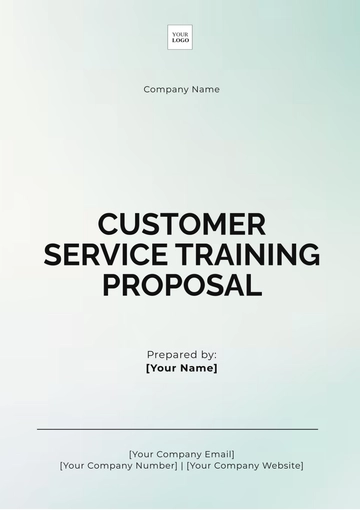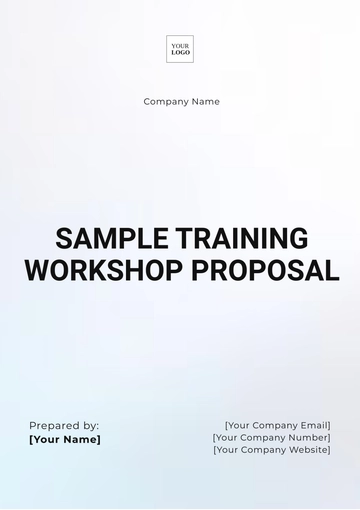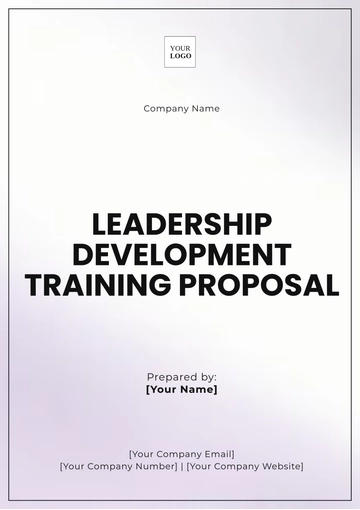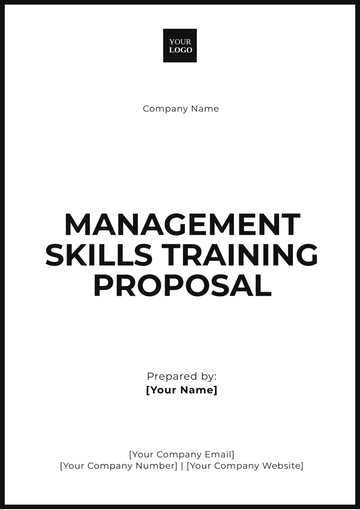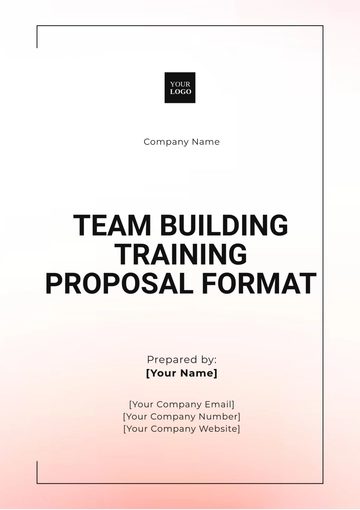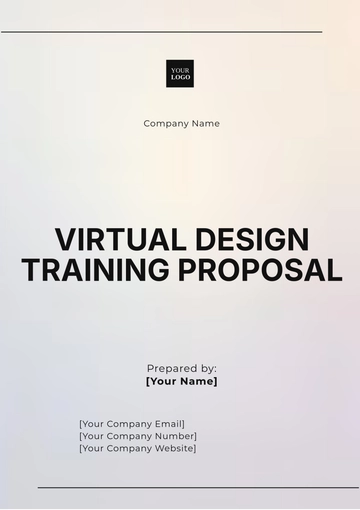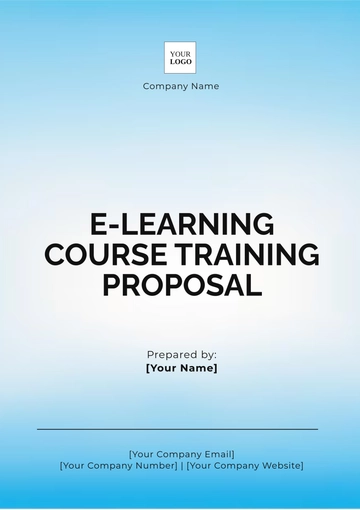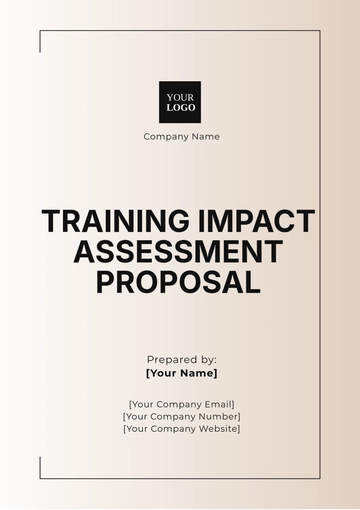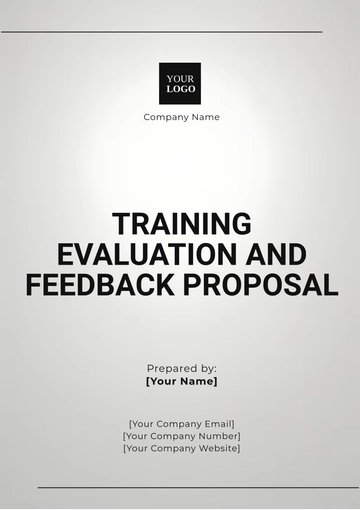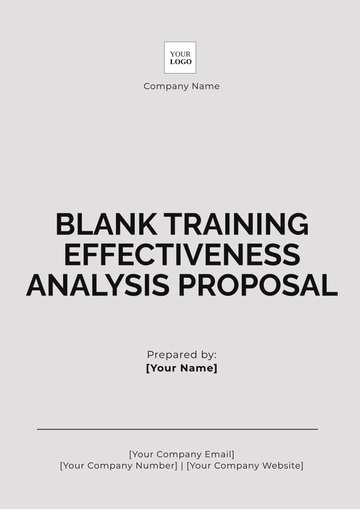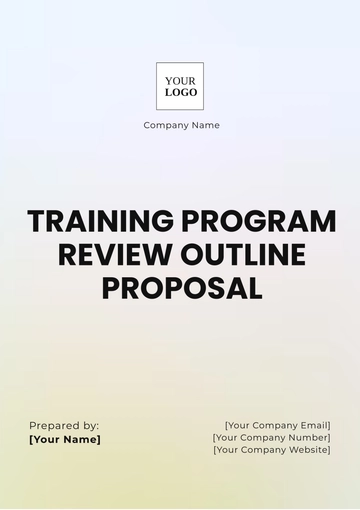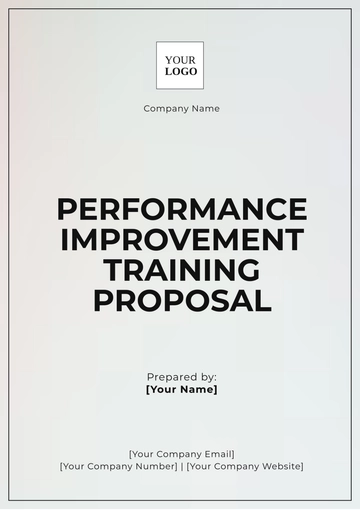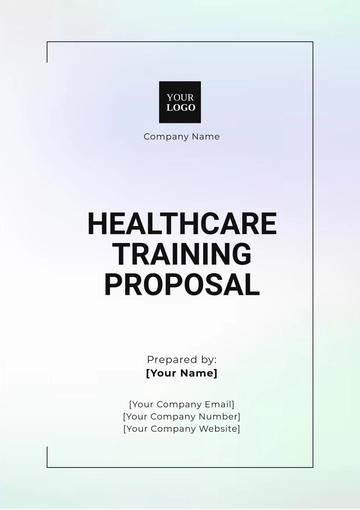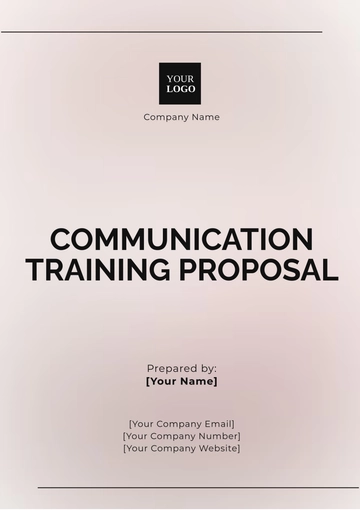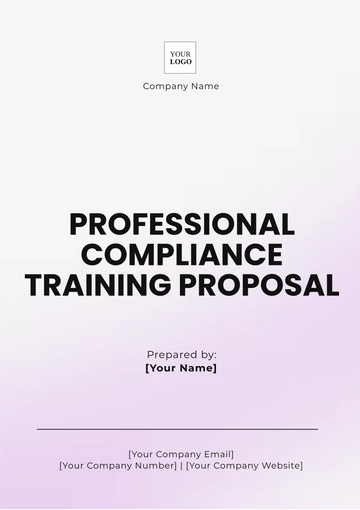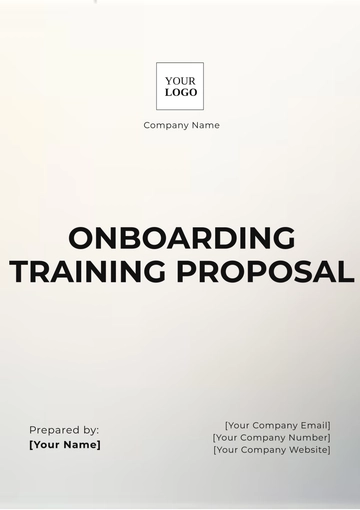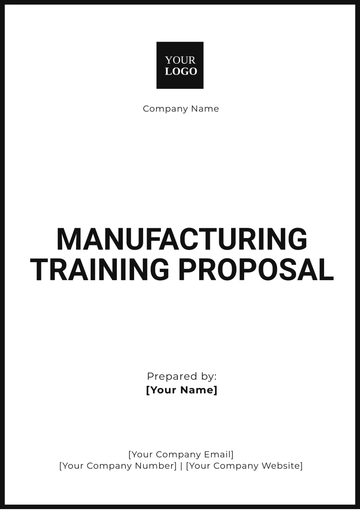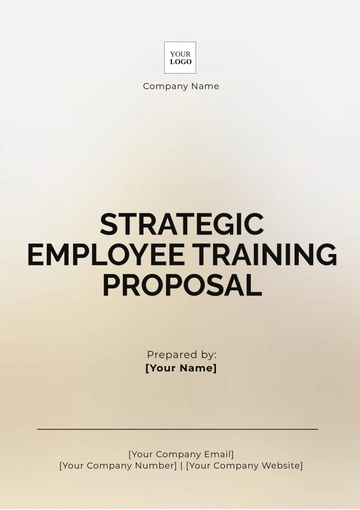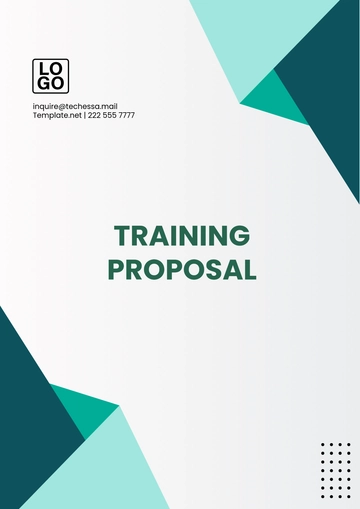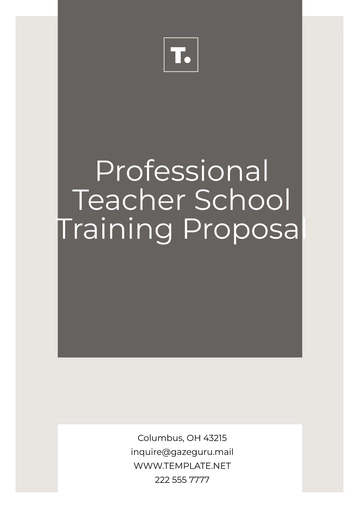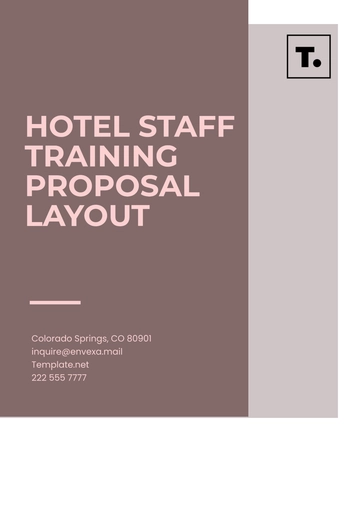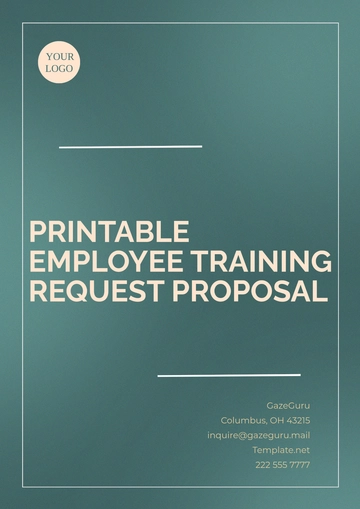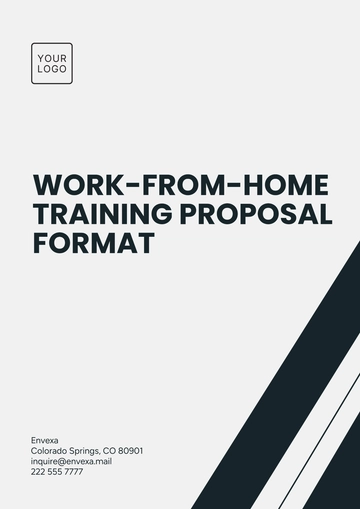Free Manufacturing Training Proposal
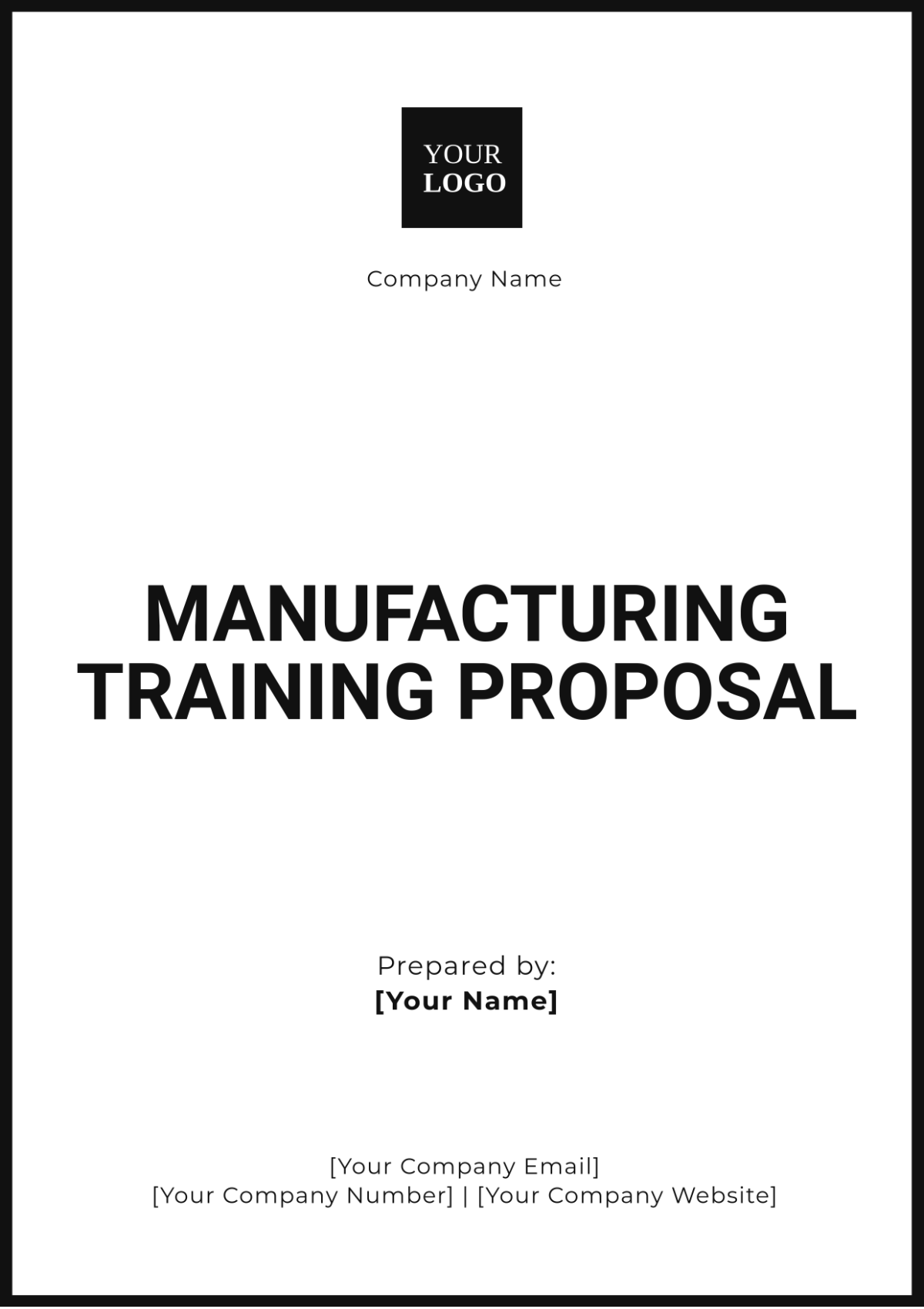
Prepared by: [Your Name]
Company: [Your Company Name]
Date: [Date]
I. Introduction
This Manufacturing Training Proposal aims to outline a detailed plan for implementing training initiatives within our manufacturing facility, [Your Company Name]. Our organization is committed to equipping our workforce with the necessary skills to enhance productivity, ensure safety, and adapt to new technologies. With an increasing demand for our products and a rapidly evolving industry landscape, it is crucial to invest in our employees' development. This proposal identifies specific training needs, establishes clear objectives, and describes the methodologies and expected outcomes of the proposed training programs. By aligning our training initiatives with organizational goals, we can foster a culture of continuous improvement and operational excellence.
II. Training Needs Assessment
To develop an effective training program, it is crucial to perform a comprehensive training needs assessment. This will help identify the skill gaps and areas for improvement within our manufacturing operations.
A. Current Skills Analysis
The current skills analysis involves evaluating the existing competencies of our workforce against the skills required to meet current and future production demands. This analysis will utilize surveys and performance metrics to gain insights into employee proficiency levels.
Methods of Analysis:
Conduct skills assessments and competency mapping to identify strengths and weaknesses.
Gather feedback from team leads and supervisors to understand practical skill applications.
B. Safety Compliance Review
A review of our current safety practices and compliance with industry and regulatory standards will be conducted to identify areas where safety training could enhance overall workplace safety.
Key Focus Areas:
Assess compliance with OSHA regulations and internal safety protocols.
Identify incidents and near-misses to determine recurrent safety training needs.
C. Technology Integration
New technologies and automation require an assessment of our workforce's comfort and proficiency with these tools to identify necessary training interventions.
Assessment Techniques:
Surveys to gauge employee familiarity with recent technology implementations.
Practical demonstrations of new tools to identify gaps in understanding.
III. Training Objectives
The training objectives serve as a framework to ensure that the training programs meet the specific needs of our manufacturing environment.
A. Enhance Skill Competency
Provide training that focuses on key competencies necessary for effective manufacturing processes, reducing errors, and enhancing efficiency.
Expected Outcomes:
Improved production metrics and reduced rework rates.
Increased employee confidence in performing critical tasks.
B. Improve Safety Standards
Implement training that bolsters safety awareness and compliance, aiming to reduce accidents and ensure a secure working environment.
Expected Outcomes:
Decrease in workplace accidents by at least 30% within the next year.
Higher safety compliance rates in internal audits.
C. Foster Technological Adaptation
Equip personnel with skills to confidently use new manufacturing technologies, enhancing overall productivity and technological integration.
Expected Outcomes:
Increased productivity by 15% as a result of improved technology utilization.
Enhanced team adaptability to future technology changes.
IV. Training Methodology
The methodologies outlined here will provide effective, engaging, and accessible training experiences for our team members.
A. On-the-Job Training (OJT)
Direct skill application in the workplace, allowing employees to learn through practical, hands-on experience.
Implementation Strategy:
Pair new employees with experienced mentors to facilitate knowledge transfer.
Schedule regular feedback sessions to address challenges during the training.
B. Workshops and Seminars
Conduct targeted workshops and seminars to cover specific areas such as safety training and technical skill enhancement.
Proposed Topics:
Safety protocol refreshers.
Advanced manufacturing techniques and best practices.
C. E-Learning Modules
Offer flexible online training programs, enabling employees to learn at their own pace and revisit material as needed.
Benefits:
Allows for flexible scheduling to accommodate production demands.
Provides access to a library of resources and self-paced learning paths.
V. Training Program Outline
Training Module | Target Audience | Duration | Methodology |
|---|---|---|---|
Safety Training | All Employees | 1 Day | Workshop |
Advanced Machine Operations | Machine Operators | 3 Days | On-the-Job Training (OJT) |
Tech Integration | All Employees | 5 Hours | E-Learning |
Quality Control Practices | Quality Assurance Team | 2 Days | Workshop |
Leadership Development | Supervisors and Leads | 3 Days | Seminars |
VI. Evaluation Plan
Evaluation is essential to determine the effectiveness of the training programs and to make informed decisions for future training initiatives.
A. Pre- and Post-Training Assessments
Conduct assessments before and after the training sessions to measure knowledge gains and skill improvements.
Methods:
Standardized testing and practical demonstrations.
Self-assessment questionnaires.
B. Participant Feedback Surveys
Collect feedback from participants regarding the training experience, content relevance, and areas for improvement.
Implementation:
Distribute surveys immediately following training sessions.
Analyze results to identify trends and make necessary adjustments.
C. Performance Metrics Analysis
Monitor key performance indicators (KPIs) to assess the long-term impact of the training on operational efficiency and safety compliance.
KPIs to Track:
Production output rates.
Several safety incidents were reported.
VII. Budget
Below is a preliminary budget estimate to support the implementation of the proposed training programs.
Item | Cost |
|---|---|
Training Materials | $10,000 |
Instructor Fees | $15,000 |
Facility Rental | $5,000 |
Technology Licenses | $2,000 |
Evaluation Tools | $3,000 |
Total | $35,000 |
VIII. Conclusion
This Manufacturing Training Proposal provides a comprehensive plan to enhance our manufacturing operations through targeted training initiatives. By focusing on skill enhancement, safety improvements, and technological advancements, we aim to significantly improve our workforce's efficiency, safety, and readiness for future challenges. With your approval, we look forward to implementing this proposal and achieving the desired outcomes. We believe that investing in our employees not only enhances their skill sets but also contributes to the overall success and competitiveness of [Your Company Name].
- 100% Customizable, free editor
- Access 1 Million+ Templates, photo’s & graphics
- Download or share as a template
- Click and replace photos, graphics, text, backgrounds
- Resize, crop, AI write & more
- Access advanced editor
Create clear and effective proposals with the Manufacturing Training Proposal Template from Template.net. This editable and customizable template is designed to help you outline manufacturing training programs with ease. Modify sections as needed for specific training sessions, and enjoy quick updates as it’s fully editable in our AI Editor Tool for maximum flexibility.
You may also like
- Business Proposal
- Research Proposal
- Proposal Request
- Project Proposal
- Grant Proposal
- Photography Proposal
- Job Proposal
- Budget Proposal
- Marketing Proposal
- Branding Proposal
- Advertising Proposal
- Sales Proposal
- Startup Proposal
- Event Proposal
- Creative Proposal
- Restaurant Proposal
- Blank Proposal
- One Page Proposal
- Proposal Report
- IT Proposal
- Non Profit Proposal
- Training Proposal
- Construction Proposal
- School Proposal
- Cleaning Proposal
- Contract Proposal
- HR Proposal
- Travel Agency Proposal
- Small Business Proposal
- Investment Proposal
- Bid Proposal
- Retail Business Proposal
- Sponsorship Proposal
- Academic Proposal
- Partnership Proposal
- Work Proposal
- Agency Proposal
- University Proposal
- Accounting Proposal
- Real Estate Proposal
- Hotel Proposal
- Product Proposal
- Advertising Agency Proposal
- Development Proposal
- Loan Proposal
- Website Proposal
- Nursing Home Proposal
- Financial Proposal
- Salon Proposal
- Freelancer Proposal
- Funding Proposal
- Work from Home Proposal
- Company Proposal
- Consulting Proposal
- Educational Proposal
- Construction Bid Proposal
- Interior Design Proposal
- New Product Proposal
- Sports Proposal
- Corporate Proposal
- Food Proposal
- Property Proposal
- Maintenance Proposal
- Purchase Proposal
- Rental Proposal
- Recruitment Proposal
- Social Media Proposal
- Travel Proposal
- Trip Proposal
- Software Proposal
- Conference Proposal
- Graphic Design Proposal
- Law Firm Proposal
- Medical Proposal
- Music Proposal
- Pricing Proposal
- SEO Proposal
- Strategy Proposal
- Technical Proposal
- Coaching Proposal
- Ecommerce Proposal
- Fundraising Proposal
- Landscaping Proposal
- Charity Proposal
- Contractor Proposal
- Exhibition Proposal
- Art Proposal
- Mobile Proposal
- Equipment Proposal
- Student Proposal
- Engineering Proposal
- Business Proposal
